Anchovies are a popular type of fish that are enjoyed by many humans around the world. They are commonly used as a topping for pizzas and added to sauces for added flavor.
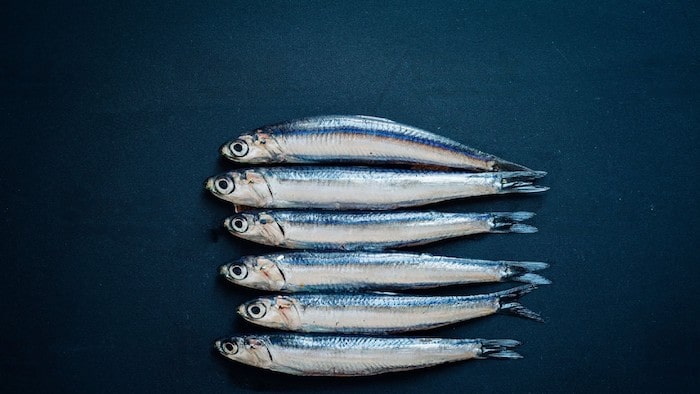
However, as a cat owner, you may wonder whether anchovies are safe for your feline friend to consume. Cats have unique dietary needs, and certain human foods can be harmful to their health.
In this article, we will explore the question of whether cats can eat anchovies, the potential benefits and risks, and provide guidance on how to safely incorporate anchovies into your cat’s diet.
Read on to learn more about feeding anchovies to cats.
What Are Anchovies?
Belonging to the Engraulidae family, anchovies are tiny saltwater fish. Although they are mostly present in the Mediterranean Sea and the Black Sea, they can also be found in other regions such as Pacific and Atlantic Oceans.
Anchovies are known for their unique taste and frequently utilized as a seasoning component in different recipes. They usually come in canned or jarred containers, and can be mixed into dressings, pizzas, or sauces to enhance the flavor.
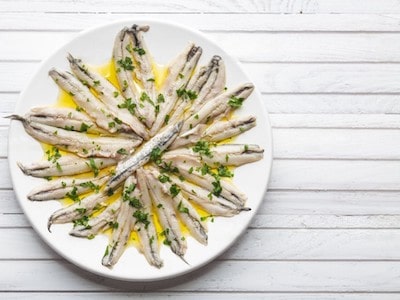
Anchovies are a healthy addition to any diet as they provide protein, omega-3 fatty acids, vitamins and minerals without adding many calories or fat due to their high nutritional value.[1]
Some potential health benefits of consuming anchovies include reducing inflammation, improving heart health, and boosting brain function.
However, it’s important to note that these benefits have mainly been studied in humans, and more research is needed to determine whether these benefits apply to cats as well.
Can Cats Eat Anchovies?
While cats can technically eat anchovies, it’s important to be aware of the potential risks and benefits before feeding them to your feline friend.
The dietary requirements of cats are distinct from those of humans, and their digestive tract is not suited to digest certain foods. Although anchovies can provide protein and omega-3 fatty acids that are beneficial to cats, excessive intake may lead to sodium toxicity which is harmful.
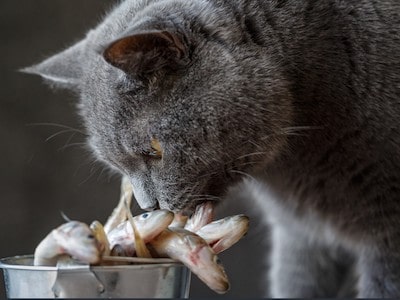
Moreover, canned or jarred anchovies may contain harmful preservatives or additives that can be dangerous for cats. Thus, it is crucial to carefully examine the label before feeding your cat anchovies to ensure their safety.
Feeding anchovies to cats in moderation can have some potential health benefits. This is because the protein found in anchovies can help support muscle development, and the omega-3 fatty acids present in them can improve skin and coat health of cats.
The decision to feed your cat anchovies will ultimately depend on its specific dietary requirements and preferences. Consulting with a veterinarian is crucial before introducing anchovies into your cat’s diet to ensure that it is both safe and suitable.
Additionally, the vet can assist you in determining the appropriate amount of anchovy for your cat as well as how frequently it should be fed.
Risks and Benefits of Feeding Anchovies to Cat
Feeding anchovies to cats can have both potential risks and benefits. Here are some of the main considerations:
Risks:
- High sodium content: If consumed excessively, anchovies can be harmful to cats as they are often rich in sodium. This high intake of salt can cause health problems such as dehydration and high blood pressure among other issues.
- Additives and preservatives: When reading labels, it’s crucial to look out for preservatives or other additives in canned or jarred anchovy products that may be detrimental to cats. One should avoid purchasing items that contain substances recognized as hazardous for cats.
- Allergies: Allergic reactions such as itching, vomiting, or diarrhea can occur in cats who are allergic to anchovies or other types of fish.
Benefits:
- Protein: Cats require essential nutrients such as protein, which is abundantly found in anchovies. Protein facilitates muscle development and repair whilst also aiding various bodily functions.
- Omega-3 fatty acids: Omega-3 fatty acids found in anchovies can enhance the skin and coat health of cats. These fatty acids are also known for their anti-inflammatory properties, which can assist cats with specific health issues.
- Palatability: Cats who are picky eaters or need to be enticed into eating certain types of food may benefit from the fact that anchovies are a tasty treat enjoyed by many felines.
Alternatives to Feeding Cats Anchovies
If you are concerned about the potential risks of feeding anchovies to your cat or your cat is allergic to fish, there are several alternative protein sources that you can consider incorporating into your cat’s diet. Here are some options:
- Chicken: Cats can benefit from chicken as a protein source, which is also convenient to prepare. Chicken can be cooked, boiled or included in their raw food diet (with proper balance). However, it’s essential to eliminate all bones and skin since they may pose risks for cats.
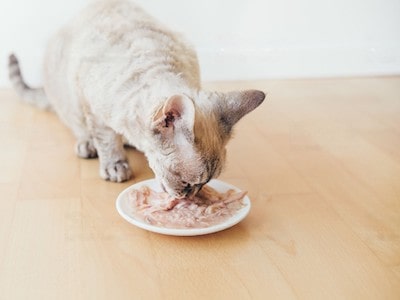
- Turkey: Turkey is a good source of protein for cats and can be easily prepared, much like chicken. It can be cooked, boiled, or fed raw as part of a balanced raw food diet.
- Beef: Another good source of protein for cats is beef. Ground beef or small pieces of cooked beef (without bones) can be fed to your cat.
- Eggs: Cats can derive a good amount of protein from eggs, which are versatile enough to be prepared in different ways. However, it is important to ensure that the eggs are cooked thoroughly in order to eliminate any possibility of salmonella contamination.
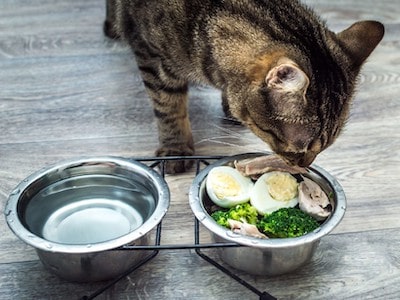
- Tuna: Cats may relish tuna, but it is advisable to be careful while feeding it as this fish has high levels of mercury that can harm your feline friend when consumed in excess. It is recommended to restrict the intake of tuna and offer it only occasionally rather than making it a regular part of their diet.

FAQs
Should I give my cat fresh or canned anchovies?
Both fresh and canned anchovies can be given to cats. However, canned anchovies can contain preservatives and high levels of sodium, so it’s important to choose a high-quality brand and only give your cat a small amount.
Can kittens eat anchovies?
While kittens can eat anchovies, it’s important to introduce new foods gradually and in moderation. Kittens have delicate digestive systems and can be more sensitive to certain foods. It’s best to consult with your veterinarian before introducing anchovies or any new food to your kitten’s diet.
Can anchovies cause allergies in cats?
Yes, like any other food, anchovies can cause allergies in cats. Some common signs of an allergic reaction include itching, vomiting, diarrhea, and skin rashes. If you notice any of these symptoms in your cat after giving them anchovies, it’s best to stop feeding them this food and consult with your vet.
Can I give my cat anchovy-flavored cat food?
Yes, there are some cat foods that are flavored with anchovies. However, it’s important to check the ingredient list to make sure that anchovies are not the primary ingredient, and that the food is nutritionally balanced for your cat’s needs.
Well, It’s a Wrap
To summarize, cats can enjoy anchovies as a nutritious snack in moderation. These small fish are packed with protein, omega-3 fatty acids and other essential nutrients that support feline health.
However, it’s crucial to offer only a limited amount of anchovies and observe your cat’s response to the food. Overfeeding on this type of treat may lead to digestive issues while excessive sodium levels may be harmful for some cats’ medical conditions.
Before introducing any new foods like anchovies into your cat’s diet or storage methods should also be taken care off properly; consulting with a veterinarian is always recommended in such cases too.

Charlene Pare is the founder of Cat Likes Best. She manages and strategizes the content published on this website. When she isn’t working, she enjoys exploring the city around with her Ameican Shorthair kitty–Moli. Being a technocrat and an avid cat lover, she also writes on pet tech products and some of the featured articles.




